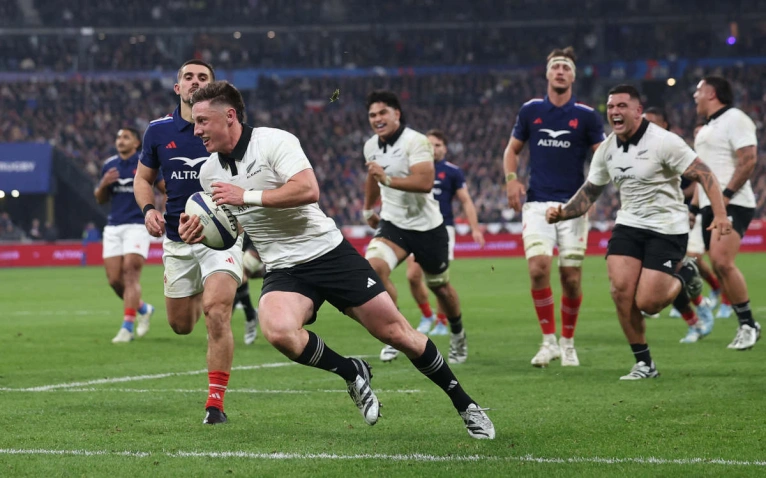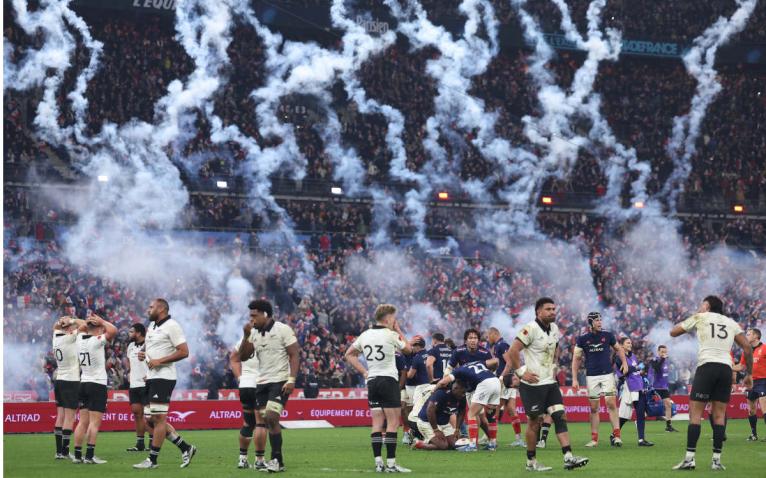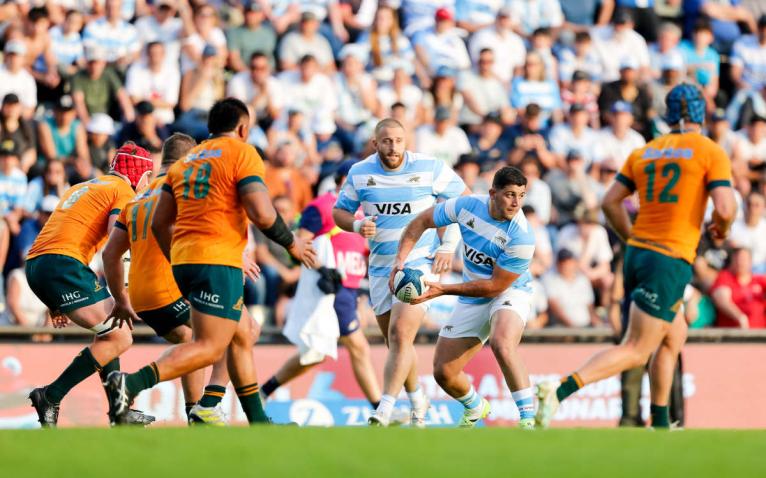Last week didn’t appear to be a great one for the All Blacks, losing to France in Paris and therefore failing to exorcise the demons that may have been lingering there from last year’s World Cup opening game and final.
It really didn’t feel good for the coaching staff that for the fourth time this year, the All Blacks lost a game that was for the taking, after they ran France ragged for 40 minutes. Failing to land the killer blow has, unfortunately for head coach Scott Robertson, become the story of the All Blacks’ 2024 season.
They had South Africa on the ropes twice earlier this year but couldn’t find a way to surge through the last quarter to resist the bomb squad. And they were in control of their opening Rugby Championship Test against Argentina, only to again drift out of things later in the piece.
The story repeated in France, when after leading 17-10 at half-time – a half in which they had forced their opposition to make 111 tackles – they conspired to once again lose their way through a series of small errors, ill-disciplined moments, a little bit of harsh officiating and classic French opportunism.

A game that should have been won, ended up being lost by a point and the dream of completing a clean sweep on their five-game Northern tour died and so did the prospect of them finishing the season with an 80 per cent win ratio.
Now, the best the All Blacks can achieve if they beat Italy in Turin, is a 71 per cent return – a figure which is in line with what they achieved in 2022 and nearly got Robertson’s predecessor, Ian Foster, the sack.
But despite not winning in Paris, there were numerous reasons for the All Blacks, and indeed the wider New Zealand rugby fraternity to feel that it was a great weekend, and that the last few weeks have potentially signalled significant reasons to be optimistic about the immediate future, as they have illustrated how the world rugby order is potentially going to change in this World Cup cycle.
The All Blacks made some telling breakthroughs in Paris, none more significant than the success of their strategy to not kick the ball back to France.
All year the All Blacks have battled to implement a clever and orchestrated kicking strategy, which is essentially why Damian McKenzie was dropped at the end of the Rugby Championship.
All year the All Blacks have battled to implement a clever and orchestrated kicking strategy, which is essentially why Damian McKenzie was dropped at the end of the Rugby Championship.
The coaches lost faith that he could use his boot to punish and pressure teams and so they turned to the more experienced and reliable Beauden Barrett to fulfil that role.
But against France, they simply didn’t kick the ball at all, in an effort to run the French off their feet. Every time Anthoine Dupont or Tomas Ramos kicked high or long, the All Blacks – be it Will Jordan, Barrett, McKenzie, Caleb Clarke or Sevu Reece – never once opted to kick back after they had taken possession.
It was relatively high risk, but the likes of Jordan cover the ground so well that he was able to ensure that by the time he hit the French defensive line, he had enough support around him to avoid being turned over.
And what it did was pave the way for the All Blacks to hold the ball for longer and through more phases than they have in any other game this year and they forced France to make 111 tackles in the first half and a total of 208 in the game.
🇳🇿 New Zealand open the scoring in Paris!
💪 Flair, strength and power get the @AllBlacks on the scoreboard!#AutumnNationsSeries | #FRAvNZL pic.twitter.com/fohGhEBllP
— Rugby on TNT Sports (@rugbyontnt) November 16, 2024
France were gasping and scrambling at times as a result, but after scoring two, well-constructed, clinical tries in the first half, the All Blacks lacked the precision to land the killer blow in the second.
They didn’t have the accuracy of pass or timing to finish promising situations and on one occasion, when Tupou Vai’i off-loaded out of a tackle to Will Jordan, it ended up being a 14-point hit.
His pass went behind Jordan who would have coasted home to score had it gone to hand, but instead it led to Louis Bielle-Biarrey touching down for France.
We wanted to hold the ball and put a lot of pressure on them by making them make a lot of tackles,” Robertson confirmed after the game.
“Maybe at times we could have kicked a little bit more and maybe if we had caught the last pass, we would have been glad we held the ball.
There was an important off-field result for the All Blacks last week as well, which saw their preferred candidate, Brett Robinson, elected as the new chair of World Rugby.
“It is fine margins in that regard, but we certainly created a lot.”
And that’s the thing, holding the ball for longer did enable the All Blacks to create more than enough opportunities to win the game and if they are brave enough to continue with a much higher run-to-kick ratio then they may find they have cracked the formula that plays to their strengths and challenges the power athletes that South Africa, France, Ireland and England all favour.
There was an important off-field result for the All Blacks last week as well, which saw their preferred candidate, Brett Robinson, elected as the new chair of World Rugby.
Robinson told the NZ Herald ahead of the vote that: “We have become a power-based, short spurt large body game and there is a desire for us to move back to the centre where endurance, agility, fatigue frees up a game.”

It was a message intended to say that should he land the job, he would like to keep pushing for amended laws that enable games to be more aerobic and free-flowing, and for teams to feel incentivised to play with the ball rather than without it.
But the bigger reason it was actually a good week for New Zealand, was the continued resurgence of Australia, the confirmation that Argentina are a genuine contender and the continued domination of the Springboks.
The results over the last two weeks suggest that the balance of power, which started to swing at the World Cup, has shifted further towards the teams playing below the Equator.
What has become clear is that South Africa are both in actuality and any other subjective measure, the number one team in the world.
As for Australia, they are on a journey to make a lot of Northern pundits choke on their ill-chosen words about the Wallabies being a waste of time for the British and Irish Lions to play next year.
There’s seemingly nothing between New Zealand, France and Ireland on the next rung down and then, arguably, England, Argentina and Australia and possibly Scotland, sit one step down from that.
What that means is that the Southern Hemisphere has the basis now to mutually improve one another, toughen each other up and bring the absolute best out of each other.
The Pumas made the World Cup semi-final, but that may have been as much to do with a kindly draw rather than any sustained excellence on their part.
Now they appear to be the real deal having beaten the All Blacks in Wellington, the Boks at home and then coming within a whisker of upsetting Ireland in Dublin. It says everything about their attitude and belief that they were genuinely distraught to not have put Ireland away.
As for Australia, they are on a journey to make a lot of Northern pundits choke on their ill-chosen words about the Wallabies being a waste of time for the British and Irish Lions to play next year.
The Wallabies, more so than Argentina, are the game’s great improvers and having shown signs of a recovery against the All Blacks in their last two Rugby Championship encounters, they had their breakthrough moment at Twickenham with an incredibly brave and innovative try to secure an unlikely victory, and then obliterated Wales.

Wales are in the midst of a dreadful period, but still, a year ago, it was Wales inflicting a record defeat on the Wallabies at the World Cup and the growth of Australia in the last 13 months under Joe Schmidt’s leadership has been considerable.
And it’s the recovery and rejuvenation of Argentina and Australia that will have the greatest impact on driving the All Blacks to new heights in this World Cup cycle.
On the surface, it was a bad last week for the All Blacks. But digging a little deeper it seems it was a week that should be furnishing optimism and confidence about the future.
There are no easy games now in the Rugby Championship and this gremlin the All Blacks have of not being able to finish teams off, has more chance of being worked out the system now that Argentina and Australia are resurgent.
The All Blacks simply won’t win enough Tests if they are not at their best and after years of dominating Australia and sending their B team to play Argentina, they are going to find in 2025 that if they don’t discover a ruthless streak and learn how to be clinical and precise in the big moments, then they will tumble down the world rankings.
On the surface, it was a bad last week for the All Blacks. But digging a little deeper it seems it was a week that should be furnishing optimism and confidence about the future.


Current All Black side is much improved on what they were in the first half of this season. Several of their losses have been by less than 5 points and with an ounce of luck and less bizarre officiating could have been reversed. Forward pack is functioning well but we deficiencies with use of the ball in the back line. Our midfield lacks penetration and we could still do with more overall depth. Not insurmountable
No use blaming the officiating as the passing and catching and outside back finishing has been sub par all season. Reece on the wing lacks place and size.
Based on this year's performance there's been a really massive problem unfolding with the deification of Cane, Perenara, other guys that have won zero world cups and playing McKenzie at ten.
I like McKenzie but he either starts at ten if Beaudens injured or he doesn't make the twenty three.
The bench needs to be filled with pace and power and size.
As Kerr Barlow says the days of winning in the final twenty minutes against these top sides is over.
This coaching group is spluttering along with a mix of solid gains in the tight five but the attack dropping the ball.
Schmidt's available after two years and if next year is like this year then NZ rugby needs to bring him in to work with Razor and give him the attack coaching role and selector.
Saveas performance is about to fall off a cliff as he reaches thirty two and follows his dream to play for New Zeeland's worst super rugby franchise. That needs planning now.
If the Allblacks are too have any chance of winning RWC in Australia they've got to fix the distribution out of midfield, get a genuine blindside to compete with Pieter du Toit and sort the effectiveness of the wingers which apart from Telea and Jordan haven't been scoring enough tries.
Ardie about to fall off a cliff because he is 30ish or is just speculation with no evidence mate and sorry but did we not just see 2 players on WE who play same positions as him, Ardie is fantastic player who plays all the time …he has another sabbatical in 26 back in Japan to freshen up before u make to many changes to everyone let’s see how they go next year 2 test wins against Boks woujd go a long way to proving u wrong
They lost in Paris last year and this year, because of bum referee plants by the IRB.
Nothing surer EW but who will ever admit to that! 🥲 The biggest games deserve the top refs without question! 🙃
Thank you Gregor for the confirmation that our SH teams can now hone TRC results in competition to progress our rankings with Australia now rediscovering their mojo really quickly with Joe's help 🤪 after Eddies woeful lack focus last year! 😵 'cos speed of recovery shows that right cattle were present all the time and just had to nurtured in the right way so at last LIONS tour can thrive meaningfully 😍
ALLEZ ANDY FARRELL & TEAM! WALLABIES will be well prepared by JOE SCHMIDT & CO as U probably already knew 😘
Lost in Paris last year due to poor discipline. Nothing else. Not to mention a referee doesn't determine who wins or loses a game. Any team that has to rely on a favourable call or two to win simply never did enough to deserve it in the first place.
Agree the officiating was not up to standard but they have to take them out of affecting the result.